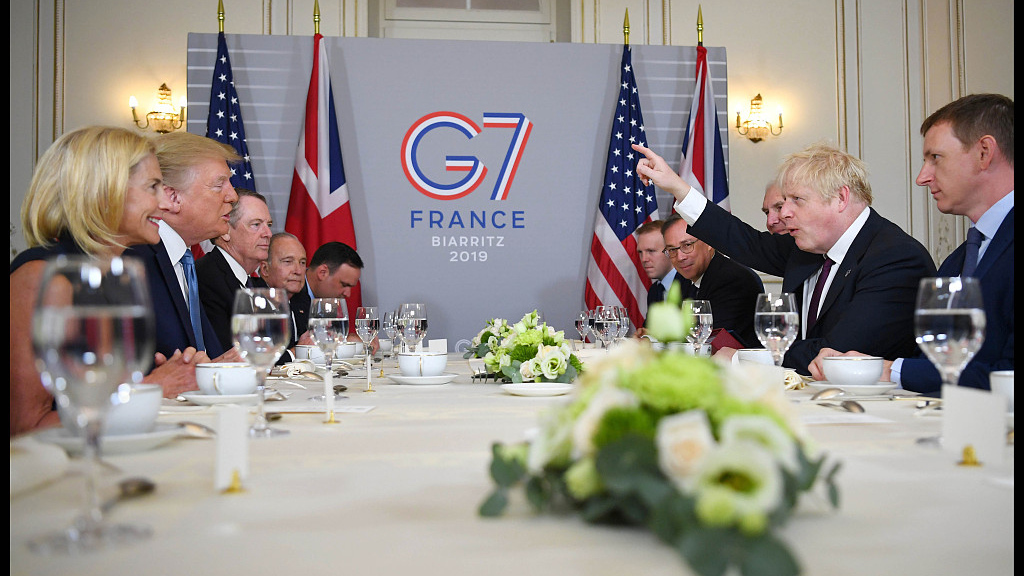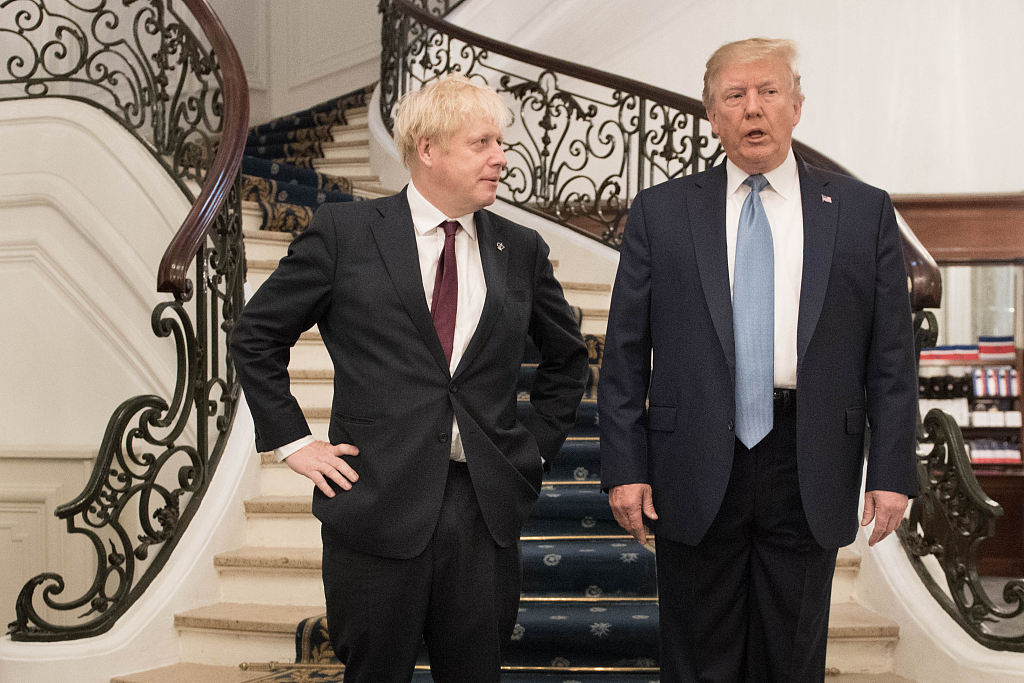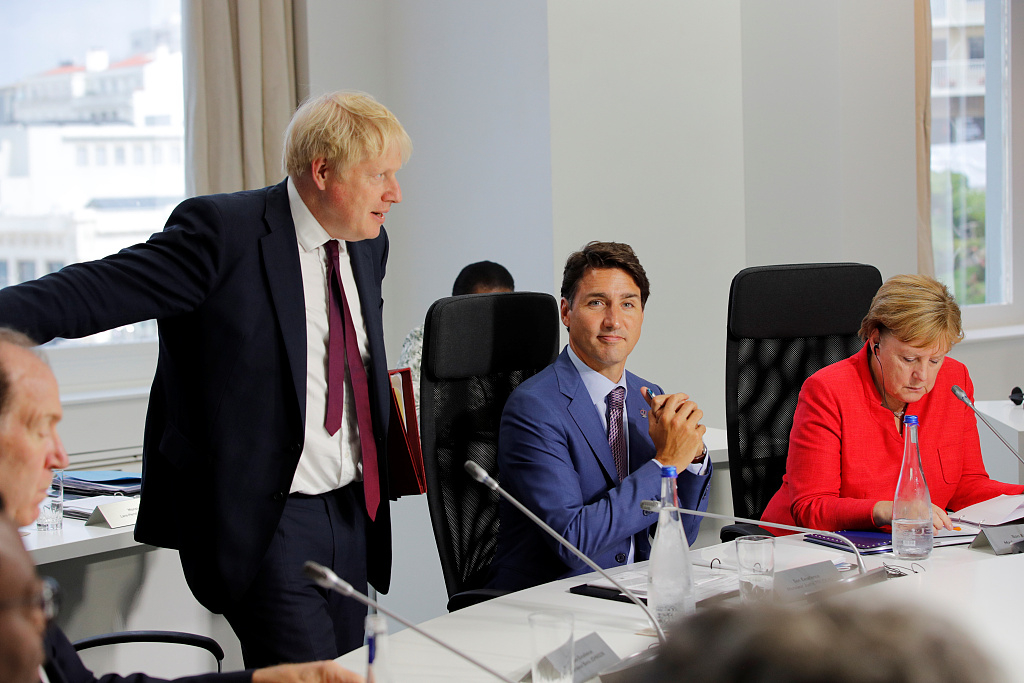

Editor's note: Tom Fowdy is a British political and international relations analyst and a graduate of Durham and Oxford universities. He writes on topics pertaining to China, the DPRK, Britain and the United States. The article reflects the author's opinions, and not necessarily the views of CGTN.
At the G7 summit in Biarritz, British Prime Minister Boris Johnson publicly called for an end to the U.S.-China trade war, denouncing tariffs and hoping for an optimistic end to the conflict, with "tariffs cooling off". The UK leader stated that he was "very, very concerned" by the situation and stated that such was "not the way to proceed", saying that supporters of the President were "at risk of incurring the blame for the downturn in the global economy".
The open and frank comments mark a huge blow to U.S President Donald Trump, who has sought international support for his increasingly belligerent approach towards China, not least from Britain whom they have pressured over a number of issues, concerning Huawei. The event marks the second time Boris has now publicly set out his lasting interest in maintaining productive economic ties with Beijing, with the Prime Minister having offered support for the Belt and Road Initiative on his first day.
While the United States quite clearly aims to take greater influence over Britain amid Brexit, Downing Street clearly now has a different agenda, contrary to all expectations when the former London Mayor was described as "The British Donald Trump". However, Boris is at heart a strong supporter of free markets and recognizes Britain has so much to lose by alienating China, placing opportunity before the threat. With the country's economy already ailing over Brexit itself and the broader global slowdown, the Prime Minister is subsequently making it clear that the trade war does Britain no favors.
British Conservatism, despite its nostalgia for old empire, is ultimately more relaxed than American Conservatism. That is saying something. In contrast to the Republican Party's emphasis on fiery patriotism, moral issues and aggressive foreign policy, British Conservatism is as a general rule more secular, liberalized and focuses on free markets, despite the Brexit infestation that has hauled it rightwards (Leave supporting Conservative MPs were actually a minority, to begin with).

U.S. President Donald Trump and Britain's Prime Minister Boris Johnson arrive for a bilateral meeting during the G7 summit in Biarritz, France, August 25, 2019. /VCG Photo
On this background, and given Britain is in practice a small country that is not battling to maintain its own global hegemony, this produces a very different view than across the Atlantic on matters about China. The Conservative Party have at large been enthusiastic backers of economic ties with Beijing aiming to consolidate UK-China business ties. This was very much the philosophy of David Cameron and former Chancellor George Osborne, and given Johnson's origin from that faction (before he opportunistically took the Brexit reigns), it is very much his philosophy too. Thus, not quite the "British Donald Trump" he was expected to be.
But of course, Britain's economy is on the rocks too. It was recently revealed that UK GDP had contracted for the first time since 2012. The uncertain and foggy investment climate brought about by Brexit is directly slowing the economy down. In addition, Trump's trade war is now also taking a toll on global growth. This means the former London Mayor has considerably less smart in picking and choosing business partners, and thus alienating China, the world's second-largest economy, a net buyer of UK services, the largest supplier of foreign students, and a reliable source of FDI, is a non-starter.
As an advocate of Brexit, Boris additionally has a point to prove: such being that Britain can forge new and better trade relationships in the world outside of the European Union. He wants to build bridges with other Brussels while burning them with Brussels. This, of course, obviously means courting stronger trade and investment relations with non-European countries, thus again saying China simply cannot be ignored, hence his BRI comments too. If the Prime Minister fails in this objective, then Brexit itself will be deemed a failure, which will ultimately prove to be his political downfall. With the trade war putting the global economy at risk, this also makes his job much more difficult.

Britain's Prime Minister Boris Johnson , Canada's Prime Minister Justin Trudeau and German Chancellor Angela Merkel attend a working session with G7 world leaders at the G7 summit in Biarritz, France, August 25, 2019. /VCG Photo
Therefore, Boris's open comments against the conflict send a clear message to Trump: that whilst the United Kingdom is happy to seek a new agreement with the United States in the aftermath of Brexit, Trump's trade war is ultimately a bad thing which is damaging for the world and damaging for Britain, thus London won't be taking part in it. As the Prime Minister pursues his objective of forging new commercial ties beyond Europe, the actions stemming from across the Atlantic are in turn disruptive to the country's national interests and do no favors for it as he strives to renegotiate with Brussels.
In every sense, Boris has put his faith and the political platform upon the merits of free trade. That's what he wants with China, and in turn, he hopes that Trump can do the same. Increasing tariffs and escalation are hurting the global economy, and are contrary to the interests of even America's closest allies.
(If you want to contribute and have specific expertise, please contact us at opinions@cgtn.com.)

Copyright © 2018 CGTN. Beijing ICP prepared NO.16065310-3
Copyright © 2018 CGTN. Beijing ICP prepared NO.16065310-3